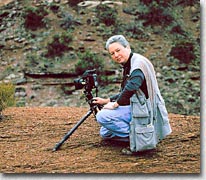The sand dunes in Death Valley present a particular problem for
photographers — footprints. Because the most popular dunes area is located
just a few miles from the town of Stovepipe Wells, in the center of the
national park, it is difficult to find an untrammeled area.
In this photograph, taken just prior to sunset, I decided to integrate the
footprints into the composition by featuring them rather than trying to
hide
them. The low cross lighting accentuates the ripples of the sand and allows
the footprints to merge naturally into the sand’s texture. Also, the warm
evening light brings out the natural color of the sand and creates a strong
counterpoint to the clear desert blue of the sky.
This photograph required extreme depth of field and exquisite sharpness to
be successful. A view camera with tilt would have been ideal but I was
using
the medium-format Rollei that day. At f/22 the Super-Angulon has depth of
field from about 30 inches to infinity. This was sufficient. Being careful
to keep the horizon level I lowered the tripod to the point where the
foreground sand was about 3 feet away and then framed the shot so that the
rippling dune passed from left to right through the frame — the natural way
the eye moves.
The image is successful because of the variety of contrasts and textures
that it offers. The large shadow area to the right adds mystery, while the
lovely textured sand keeps the eye moving and exploring the frame.
 Michael Reichmann has been a photographer, collector and teacher for more
than 30 years. After an initial career as a photojournalist he spent time
as
an executive in the software and telecommunications fields. Today he
operates The Luminous Landscape, an extensive web site devoted to the art
and technique of landscape photography. He also conducts 2
limited-enrollment
landscape workshops a year, in the spring and fall, usually somewhere in
the
American Southwest.
Michael Reichmann has been a photographer, collector and teacher for more
than 30 years. After an initial career as a photojournalist he spent time
as
an executive in the software and telecommunications fields. Today he
operates The Luminous Landscape, an extensive web site devoted to the art
and technique of landscape photography. He also conducts 2
limited-enrollment
landscape workshops a year, in the spring and fall, usually somewhere in
the
American Southwest.

